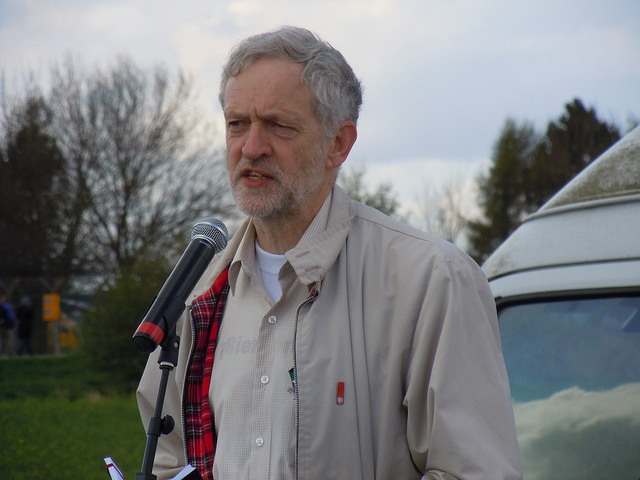Corbyn’s election was an organisational phenomenon that raises profound questions about political party ownership
Changes to the way the Labour leader is elected were an essential factor in Jeremy Corbyn’s victory. Meg Russell explains how the switch to a ‘one member one vote’ system was a fundamental change for the party – and for British politics – with last summer’s events raising profound questions about party democracy. This text is adapted from a response on the night to Steve Richards’ PSA Lecture on ‘Leadership, Loyalty And The Rise of Jeremy Corbyn’, on 15 October last year, and recently published in the Political Quarterly.
Steve Richards sets out convincingly some of the political and ideological currents that led to the rise of Jeremy Corbyn. But his unexpected election was also an organisational phenomenon – touching on key issues of internal party democracy. Changes to the mechanism for electing the leader, agreed under Ed Miliband’s leadership, were essential to Corbyn’s victory. The result raises profound questions about who does, and who should, own a political party such as Labour.
The leadership contest of 2015, which delivered Corbyn’s victory, was the first in the Labour Party’s history to be based purely on the principle of one person one vote. The question of who should choose the leader has been a particularly hotly contested one through the party’s recent history, as in many other political parties. Looking back to the 1970s, there was no involvement at all by the party outside parliament in the choice of leader – it was entirely a decision for Labour MPs. The Parliamentary Labour Party (PLP) chose its leader, who then led the party as a whole. This same principle applied in all three of the main parties.
Following defeat at the 1979 general election Labour descended into civil war, and one of the core issues of disagreement was who should have the right to choose the party’s leader. At a dramatic special conference in 1981 an electoral college was agreed – giving one third of votes to the PLP, one third to the trade unions, and one third to local constituencies. Neither constituencies nor unions were required to ballot, and could cast block votes – significantly empowering activists. This was a deciding factor in the party’s split – the so-called ‘gang of four’ announced their plan to break away and form the Social Democratic Party (SDP) the very next day.
Both supporters and opponents of this change believed that it would benefit the party’s left wing. In line with political scientist John May’s ‘law of curvilinear disparity’ it was assumed that the party’s activists were more ideologically motivated than either its MPs, or its less active supporters (including those to whom MPs must appeal in order to be elected). In line with these assumptions the SDP defectors had instead favoured a switch to ‘one member one vote’ (OMOV), which would empower all members, and the new party implemented this principle.
The subsequent years saw a long battle for the introduction of OMOV within Labour’s electoral college, and for selection of the party’s MPs. This was backed by party leader Neil Kinnock, supported by those on the right of the party, and opposed by many on the left. At one level it was an argument about different democratic principles – of representative (via activists) democracy or direct democracy – but it was also heavily driven by pragmatism in terms of likely results.
OMOV for all three parts of the electoral college was finally agreed at the 1993 party conference, but the college had always been vulnerable to a split outcome, where different sections favoured different candidates. This presented no problem in the clear-cut victories of Kinnock, or of John Smith or Tony Blair. But the college was narrowly split in 2010, when Ed Miliband beat his brother on the strength of trade union votes, despite the latter having more support among party members and MPs.
This resulted in a collapse in support for the college system, and its abandonment in favour of something closer to pure OMOV. It is hard to exaggerate how profound a shift this was compared to 40 years before. In the final ballot in 2015 individual MPs had no more power than any other voter; in this respect their power to choose the leader was almost gone. Add to this the decision to incorporate a kind of ‘open primary’ system, giving votes to ‘supporters’ who had paid just £3 to the party, and the change was bigger still – with unpredictable results.
Political scientists have charted the recent spread of primary-like arrangements in parties around the world. There are clear trade-offs – such arrangements may enhance legitimacy and participation but weaken parties in their traditional form. In important ways the party no longer belongs to its members, and it certainly does not belong to its parliamentarians.
In the Labour contest two unexpected twists on the organisational arrangements helped contribute to the result. First, MPs failed to realise that their role had fundamentally changed. They were no longer equal players with trade unions and activists, but merely gatekeepers. Their key power was controlling who got onto the ballot paper. The gatekeeper role required them to nominate (as is clear in the Conservative Party system, which is similar) only those candidates who they would be happy to let win. Second, the failure to think this through was linked to an assumption that Corbyn could never garner enough votes. Under conventional wisdom, the opening up of the ballot to ‘supporters’ (the kind of reform that Blair, after all, had always favoured) would benefit moderates or right wingers, not the left. What occurred was a turning on its head of John May’s law. The ‘supporters’ proved far more leftist than the members (though Corbyn did lead amongst both). In an age of social media the most ideologically-motivated were those who organised to sign up, while the average party voter looked on from the sidelines in bemusement.
The result is that for the first time in British political history a parliamentary party has a leader that it does not support. The change intended to avoid the embarrassment of a split result in the electoral college has instead fuelled a bigger division between the parliamentary and extra-parliamentary parties. Had the electoral college continued to operate, Corbyn would almost certainly not have won – though the split between the two groups would still have proved difficult.
In the aftermath, other fundamental questions about internal party democracy have opened up, in terms of who should control policy. These have likewise dogged the Labour Party ever since its formation. Likewise they relate to who should own the party; its leader, its parliamentarians, its members or its supporters?
Formally, the Labour Party conference is a sovereign representative body, and Corbyn has expressed some desire to return its power. But this sovereignty was always more mythical than real, with party leaders ignoring the conference when it suited them (as Gaitskell most famously did over nuclear disarmament in the 1960s). In fact, leaders traditionally controlled much of the conference through block votes cast by friendly trade unions (who until the 1990s held 90% of conference votes). A classic text on ‘the distribution of power in the Conservative and Labour parties’ concluded that although Labour was ostensibly the more democratic party, ‘in practice final authority rests in both parties with the parliamentary party and its leadership. In this fundamental respect the distribution of power within the two major parties is the same’ (p. 635)..
When the unions shifted to the left, there were quick moves to dilute their powers. Under Kinnock and Blair the union vote was reduced to 50 per cent at conference and the block vote ended. This made the conference potentially less predictable and harder for the leader to control. Notably the 2015 event chose not to debate Trident, despite Corbyn having wanted such a vote. Kinnock and Blair also built up the National Policy Forum as an intermediate representative body, with a clear emphasis on deliberation. Corbyn seems suspicious of this body. Ironically, his preferred mechanism seems to be a more direct form of democracy, going over the heads of activists and MPs (for example over the Syria vote in December 2015) to canvass the opinions of members and supporters. The last leader to experiment with such plebiscitary models was Tony Blair pre-1997. He hoped that those less closely engaged with the party would help him push it to the right; Corbyn hopes for the reverse.
These recent events reveal fascinating things about the dilemmas and challenges of party democracy. An antipolitical mood, and new opportunities for organising (albeit sometimes requiring little more commitment than a click) via social media, seem to have reversed much of what we thought we knew. Profound questions remain. To what extent should a political party belong to its members, and how much should their active service count? To what extent should it belong to its MPs, who were elected by – and are accountable to – the wider public? What is the proper role of deliberation and of collective decision-making? Fundamentally, does the Corbyn phenomenon represent a form of party revival, or another step towards party decline?
—
Note: This post originally appeared on the Constitution Unit blog and is reposted with permission. The text is adapted from a response on the night to the PSA Annual Public Lecture which was recently published in the Political Quarterly. The views contained here are those of the author and not those of Democratic Audit UK or the LSE. Please read our comments policybefore posting.
—
 Meg Russell is Professor of British and Comparative Politics, and Deputy Director of the Constitution Unit. Her books include Building New Labour: The Politics of Party Organisation (Palgrave, 2005).
Meg Russell is Professor of British and Comparative Politics, and Deputy Director of the Constitution Unit. Her books include Building New Labour: The Politics of Party Organisation (Palgrave, 2005).






 Democratic Audit's core funding is provided by the Joseph Rowntree Charitable Trust. Additional funding is provided by the London School of Economics.
Democratic Audit's core funding is provided by the Joseph Rowntree Charitable Trust. Additional funding is provided by the London School of Economics.
Corbyn’s election was an organisational phenomenon that raises profound questions about political party ownership https://t.co/ERQc0RUwSz
Corbyn’s election was an organisational phenomenon that raises profound questions about political party ownership https://t.co/JhMom4Pq1q
Interesting – Profound questions about who does, and who should, own a political party such as Labour https://t.co/gtJJ7LDeaY
Corbyn’s election was an organisational phenomenon that raises profound questions about… https://t.co/NZYpOmvZdi https://t.co/2Nll5r9F9P